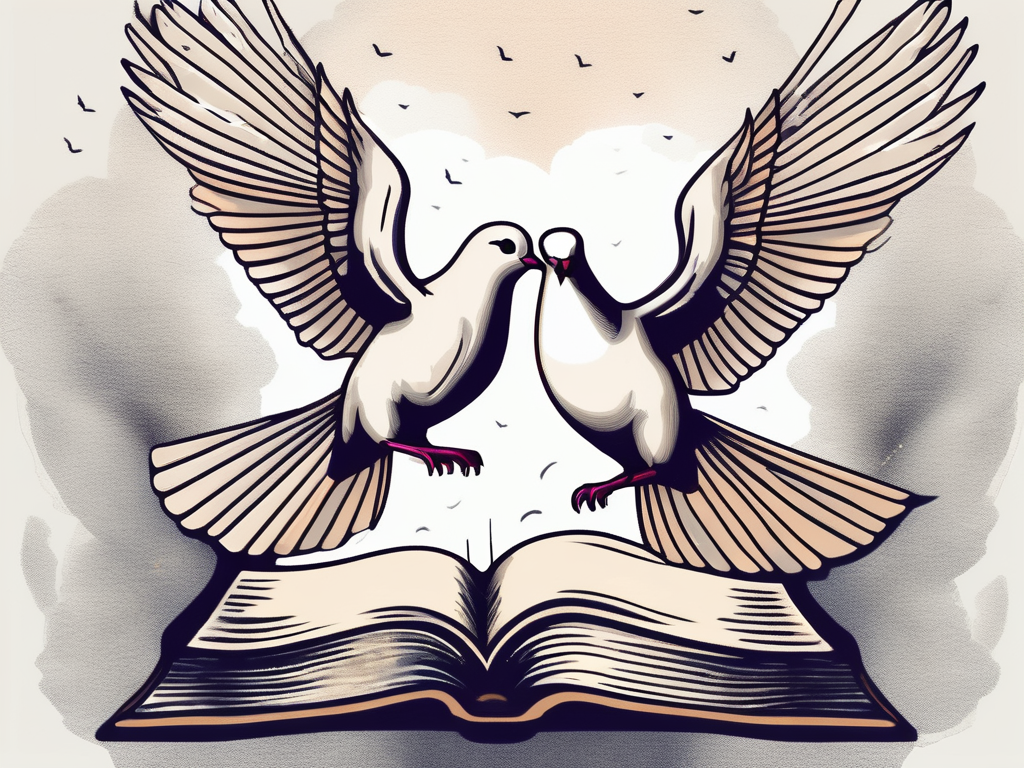In Buddhism, forgiveness is a concept that holds great significance. It offers a unique perspective on how to deal with hurt, anger, and resentment. Understanding the role of forgiveness in Buddhist teachings can provide valuable insights on how to cultivate a mindset of compassion, peace, and healing.
Understanding the Concept of Forgiveness in Buddhism
Forgiveness, in Buddhism, is not merely about letting go of past transgressions; it is a profound shift in perception and a transformative practice. It involves acknowledging the interconnectedness of all beings and realizing that holding on to grudges or seeking revenge only perpetuates suffering.
At its core, forgiveness in Buddhism is about freeing ourselves from the burden of anger, resentment, and ill-will. It is a process of recognizing our own pain and the pain of others, and choosing to respond with compassion and understanding.
In the teachings of Buddhism, forgiveness plays a crucial role in the pursuit of liberation from suffering. It is seen as an essential step towards cultivating a mind that is free from destructive emotions and capable of developing wisdom and compassion.
By forgiving others, we acknowledge the impermanent nature of existence and the ever-changing interconnectedness of all things. It is through forgiveness that we open ourselves up to the possibility of growth, transformation, and ultimately, liberation.
The concept of karma is closely intertwined with forgiveness in Buddhism. Karma refers to the law of cause and effect, emphasizing that our actions have consequences. When we forgive, we break the cycle of negative karma by choosing to respond with kindness and understanding instead of perpetuating negativity.
By cultivating forgiveness, we create positive karmic imprints that contribute to our own happiness and well-being. Furthermore, forgiving others allows them the opportunity to reflect upon their actions and potentially change their behavior, leading to their own liberation from suffering.
Forgiveness in Buddhism is not a one-time event but an ongoing practice. It requires patience, self-reflection, and a deep understanding of the interconnectedness of all beings. Through forgiveness, we not only free ourselves from the burden of anger and resentment but also contribute to the collective well-being of humanity.
One of the key teachings in Buddhism is the Four Noble Truths, which state that suffering exists, suffering arises from attachment and craving, suffering can be overcome, and there is a path to overcome suffering. Forgiveness is an integral part of this path, as it allows us to let go of attachment to past hurts and move towards liberation.
Practicing forgiveness in Buddhism also involves developing empathy and compassion towards ourselves and others. It is about recognizing that we all make mistakes and have the capacity to change and grow. By forgiving ourselves and others, we create a space for healing and transformation.
Forgiveness is not always easy, especially when we have been deeply hurt. It requires a willingness to let go of our ego and surrender to the greater wisdom of interconnectedness. However, the rewards of forgiveness are immense – a sense of inner peace, freedom from the shackles of resentment, and the ability to cultivate loving-kindness towards all beings.
The Four Noble Truths and Forgiveness
The Four Noble Truths, foundational principles of Buddhism, provide insights into the nature of suffering and the path to liberation. Forgiveness is intimately connected to each of these truths, guiding us towards a state of genuine peace and well-being.
When we delve deeper into the teachings of Buddhism, we discover that forgiveness plays a crucial role in our spiritual journey. It is not merely a superficial act, but a profound practice that can transform our lives.
The First Noble Truth: Understanding Suffering
Recognizing the reality of suffering is the first step towards forgiveness. Buddhism teaches that suffering is an inherent part of the human experience. It encompasses physical pain, emotional turmoil, and the dissatisfaction that arises from our constant craving for more. By understanding the universality of suffering, we can develop compassion for ourselves and others, leading to forgiveness.
When we acknowledge the presence of suffering, we open ourselves up to the possibility of forgiveness. We realize that everyone, including ourselves, is bound to make mistakes and experience pain. This understanding allows us to let go of resentment and replace it with empathy and understanding.
The Second Noble Truth: The Origin of Suffering and Forgiveness
The origin of suffering is believed to be rooted in attachment, greed, and ignorance. We cling to our desires and expectations, causing us to suffer when things don’t go as planned. Forgiveness serves as a powerful antidote to these afflictions, as it helps us let go of attachment to past events and unburden ourselves from the grip of negative emotions.
When we forgive, we release ourselves from the chains of attachment and greed. We free ourselves from the burden of holding onto grudges and resentments. Forgiveness allows us to break free from the cycle of suffering and find inner peace.
The Third Noble Truth: The Cessation of Suffering through Forgiveness
Forgiveness is an essential pathway to the cessation of suffering. By forgiving ourselves and others, we release the mental and emotional burdens that keep us trapped in the cycle of suffering. This liberation allows us to experience genuine peace and cultivate a compassionate heart.
When we forgive, we create space for healing and growth. We let go of the past and open ourselves up to the present moment. Forgiveness is not about condoning harmful actions or forgetting the pain caused, but rather about freeing ourselves from the grip of resentment and finding a sense of peace within.
The Fourth Noble Truth: The Path to Forgiveness
The path to forgiveness lies in the Eightfold Path, which serves as a guide for ethical conduct, mental development, and wisdom. By following this path, we cultivate the qualities necessary for forgiveness and create the conditions for lasting peace and happiness.
The Eightfold Path consists of Right View, Right Intention, Right Speech, Right Action, Right Livelihood, Right Effort, Right Mindfulness, and Right Concentration. Each aspect of the path contributes to the development of a compassionate and forgiving mindset.
By practicing mindfulness, we become aware of our thoughts and emotions, allowing us to respond to challenging situations with understanding and forgiveness. Through ethical conduct and right speech, we cultivate a sense of responsibility towards ourselves and others, fostering an environment where forgiveness can flourish.
As we progress on the path, we develop wisdom and insight, understanding the impermanent and interconnected nature of all things. This understanding deepens our capacity for forgiveness, as we realize that holding onto grudges and resentment only perpetuates suffering.
Ultimately, the Four Noble Truths and forgiveness are intertwined, offering us a profound way to navigate the complexities of life. By embracing forgiveness, we can find liberation from suffering and cultivate a heart that is open, compassionate, and at peace.
The Eightfold Path and Forgiveness
The Eightfold Path provides a comprehensive framework for living a life of wisdom and compassion. It offers guidance on how to navigate the complexities of existence and cultivate a mindset of forgiveness. Within this path, several aspects are particularly relevant to the practice of forgiveness.
Right Understanding and Forgiveness
Right Understanding involves seeing the true nature of reality, including the impermanence of all things and the interconnectedness of life. It invites us to recognize that holding on to grievances only perpetuates suffering and hinders our own growth. Through this understanding, forgiveness can arise naturally as we realize the futility of clinging to anger and resentment. We begin to appreciate the transformative power of compassion, both for ourselves and others.
When we truly understand the impermanent nature of all things, we realize that forgiveness is not a sign of weakness, but rather a reflection of our own inner strength and wisdom. It is an act of liberation, freeing ourselves from the burden of carrying grudges and allowing us to move forward with a lighter heart.
Right Thought and Forgiveness
Right Thought encompasses cultivating thoughts of non-harm, goodwill, and compassion. By actively nurturing these positive thoughts, forgiveness becomes a natural response to situations that would otherwise provoke anger and resentment. When we train our minds to focus on the well-being of others, we create a fertile ground for forgiveness to flourish.
Forgiveness is not about condoning or forgetting the harm that has been done, but rather about releasing ourselves from the negative emotions that keep us trapped in a cycle of suffering. It is a conscious choice to let go of resentment and replace it with understanding and empathy.
Right Speech, Action, and Livelihood in the Context of Forgiveness
Forgiveness extends beyond our thoughts to our words, actions, and livelihood. Right Speech entails refraining from harsh or harmful speech and promoting truthful and kind communication. When we practice mindful speech, we create an environment of understanding and openness, which can facilitate the process of forgiveness.
Right Action involves refraining from causing harm to others and instead actively engaging in acts of kindness and compassion. By embodying forgiveness in our actions, we contribute to a more harmonious and compassionate world.
Right Livelihood encourages engaging in work that is ethical and non-exploitative. When our livelihood aligns with our values, we are more likely to cultivate forgiveness in our interactions with others, as we recognize the interconnectedness of all beings and the impact our actions have on the world.
Right Effort, Mindfulness, and Concentration for Forgiving
Forgiveness requires ongoing effort, mindfulness, and concentration. Right Effort involves cultivating wholesome qualities and abandoning unwholesome ones. It requires us to actively work on letting go of negative emotions and cultivating forgiveness as a habit.
As we become more mindful of our thoughts, emotions, and reactions, we can respond with greater compassion and forgiveness. Mindfulness allows us to observe our inner landscape without judgment, and in doing so, we gain insight into the roots of our anger and resentment. With this awareness, we can choose to respond with forgiveness instead of reacting with hostility.
Concentration is the ability to focus our attention and sustain it. By cultivating concentration, we develop the mental strength to stay present with our emotions and thoughts, even when forgiveness feels challenging. It allows us to see beyond the surface level of a situation and tap into our innate capacity for forgiveness.
By integrating the teachings of the Eightfold Path into our lives, we can cultivate a mindset of forgiveness that extends beyond ourselves and benefits all beings. It is a journey of self-discovery and transformation, where forgiveness becomes a natural expression of our inner wisdom and compassion.
The Practice of Metta and Forgiveness
Metta, or loving-kindness, is a practice that is deeply intertwined with forgiveness in Buddhism. Metta meditation involves cultivating a genuine feeling of goodwill, friendliness, and compassion towards all beings.
When we engage in metta meditation, we are not only cultivating love and kindness towards others but also towards ourselves. This practice recognizes that forgiveness starts within, acknowledging our own humanity and imperfections. By extending metta towards ourselves, we create a foundation of self-compassion that allows us to extend forgiveness to others.
Forgiveness is a transformative process that requires us to let go of anger, resentment, and the desire for revenge. Metta meditation helps us develop the capacity to hold these difficult emotions with compassion and understanding, allowing them to dissolve gradually. Through this practice, we learn to respond to harm with love, rather than perpetuating a cycle of negativity.
The Importance of Loving-Kindness in Forgiveness
Loving-kindness is an antidote to anger, hostility, and resentment. By cultivating this quality, we develop a heart that is open and receptive to forgiveness. Metta helps us recognize the inherent worth and dignity of all beings, making forgiveness a natural expression of our interconnectedness.
When we hold onto anger and resentment, we are trapped in a state of suffering. Metta meditation liberates us from this suffering by cultivating a deep sense of empathy and compassion. It allows us to see the humanity in others, even those who have caused us harm, and to respond with forgiveness rather than retaliation.
Forgiveness does not mean condoning or forgetting the actions of others. It is a process of releasing the grip that past hurts have on us and finding freedom in the present moment. Metta meditation provides a space for us to acknowledge the pain we have experienced, while also cultivating the strength and wisdom to let go.
How Metta Meditation Promotes Forgiveness
Metta meditation is a powerful tool for cultivating forgiveness. By directing metta towards ourselves, others, and even those who have hurt us, we cultivate a heart that is capable of embracing forgiveness and letting go of past grievances.
Through metta meditation, we develop the ability to hold our own suffering and the suffering of others with compassion. This practice allows us to see beyond the surface-level actions and behaviors of individuals, recognizing the deeper causes of their actions. With this understanding, forgiveness becomes a natural response, rooted in empathy and understanding.
Regular practice of metta meditation strengthens our capacity for forgiveness and promotes a sense of inner peace and harmony. As we continue to cultivate loving-kindness, we create a reservoir of compassion that can be drawn upon in challenging moments. This reservoir allows us to respond to difficult situations with grace and forgiveness, rather than reacting with anger or resentment.
In conclusion, Buddhism offers profound insights into forgiveness. It teaches us that forgiveness is not a weakness, but rather a courageous act of liberation. By understanding the role of forgiveness in Buddhism, and practicing the principles outlined in the Four Noble Truths and the Eightfold Path, we can cultivate a mindful and compassionate approach to forgiveness, allowing healing, peace, and genuine transformation to manifest in our lives.












